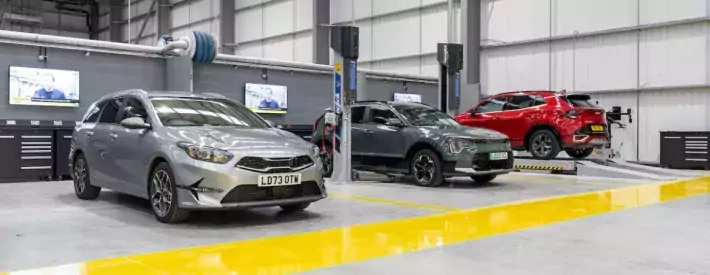How Skillnet is preparing apprentices for the jobs of the future

Eugene Lowry, Managing Director at training provider Skillnet reveals how requirements are changing and how the company is adapting ahead of an electrified future.
How are skills requirements changing in the automotive industry?
The industry is crying out for qualified technicians, so apprentices today are at an advantage if they use state-of-the-art systems, because it helps them reach the highest levels. The rate of change of expectations has been huge over the last few years, partly in response to how technology has evolved. People talk about ADAS, but we hadn’t really heard of it 5-10 years ago.
If you don't keep up with the changes – from a training point of view – you’ll get left behind. I've been involved in apprenticeship training for nearly 20 years and the speed of change now, compared with back then, is significantly quicker. Everything is changing, constantly.
What impact has electrification had on training programmes?
Each person that embarks on an apprenticeship in the automotive industry will follow a specific pathway. If Skillnet trained that apprentice to deliver just the standards laid out by Institute for Apprenticeships and Technical Education, they wouldn’t last five minutes. So the standards for apprenticeships need to change and change quicker – apprentices need to be working on electric vehicles now. Beyond that, we have to have a defibrillator in the training centres and the apprentices have to know how to use it. The same goes for first aid training – we have to do things properly. We work with our clients to not just provide an apprentice programme, but something goes way beyond that.
How is Skillnet adapting to meet future challenges?
We’re meeting with our customers and asking them what they want in their training programmes. In the case of Kia, with its new training facility in Derby, it wants to be known as the best electric vehicle brand in the UK. It clearly has a historical image and reputation, but it wants to move on from that – and having the best trained people working on its cars is part of the journey.
We work with the likes of Ford and DAF Trucks and we take exactly the same approach. Again, if we only delivered what was in the standard, Skillnet as a company wouldn’t last long. Those clients would not have technicians who, when they qualify, are fit for purpose.
How have apprentice applicants changed since the pandemic?
In my personal experience, I think they have much higher expectations now. Not just of their life in general, but of the training – and how they're trained – and how they're engaged with. They don’t like or read emails, so all our communication with them goes through apps and texts. Around 85-90% of our apprentices are under 22 and they are used to working with a phone in their hand.
How does Skillnet help apprentices to develop and use their soft skills?
Each apprentice, regardless of the qualification they are working towards, has to cover a series of life skills on the course. Because the majority of them are so young, we teach them about staying safe online as well as basic financial matters such as understanding their wage slips and if they have a bank account. We also cover age-appropriate relationships and understanding everything that comes with that – it’s surprising how much they engage with those elements. We have a mixture of classroom learning and virtual training – and they have to pass it all to move on for their own personal development.
What are the must-have skills for 2024?
After the training we deliver, we’d expect people to come out and have the confidence to say they believe they are the best technician in the world! With apprentices, it’s all about having the right aptitude. Before we take them on, we ask for a video of them repairing something. From that video we want to see that they are comfortable with the environment and enjoy breaking and then fixing something again.
One of the biggest things we work on is the transition from school to employment – and learning how to behave. Behaviour is a big thing because most apprentices are too young to have the skills or knowledge. It's our job to provide them with those attributes, which is where it comes back to their attitude to learning and how they conduct themselves.
Time to find out more about apprenticeships, the IMI has all the information you need




